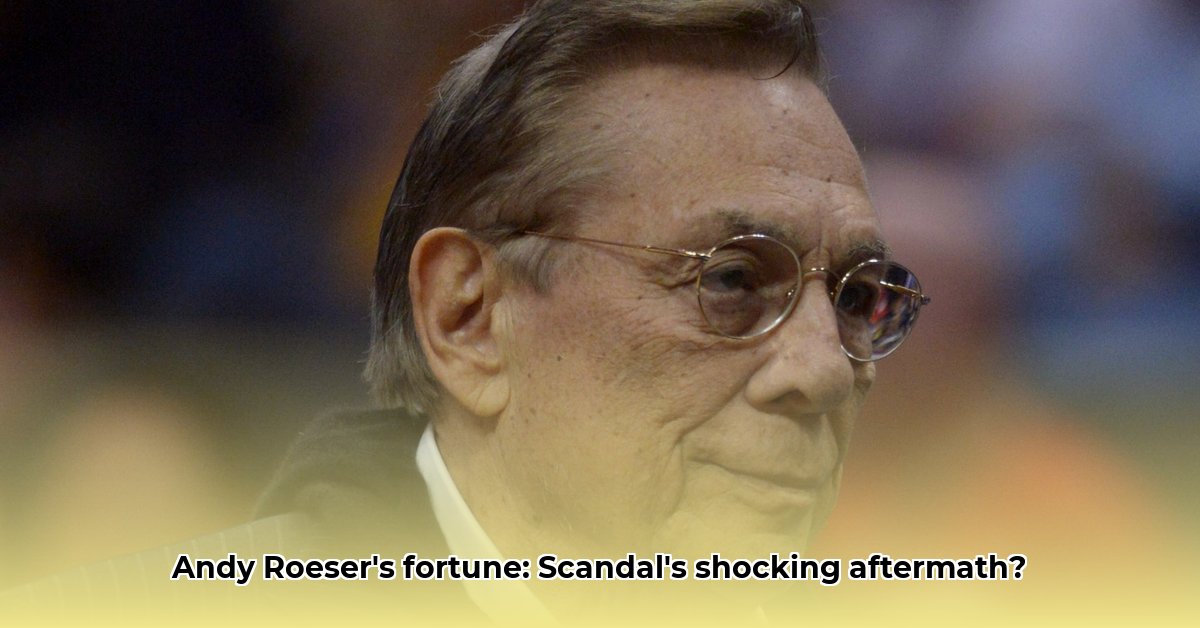
Andy Roeser: From Financial Acumen to Crisis Management
Andy Roeser, the long-time president of the Los Angeles Clippers, is a figure whose name is inextricably linked to the 2014 Donald Sterling scandal. While his personal net worth remains undisclosed, the impact of this crisis on his career and reputation offers a compelling case study in leadership, crisis management, and the unpredictable nature of public perception in professional sports. This isn't simply a story about money; it's a narrative of calculated decisions, unforeseen consequences, and the lasting impact of a single, devastating event. How did Roeser's actions, both before and during the crisis, shape his professional trajectory, and what lessons can be gleaned from his experience?
A Foundation in Finance: The Early Years
Roeser's background at Ernst & Young, a prominent accounting firm, provided a robust foundation in financial management. This expertise proved invaluable when he joined the Los Angeles Clippers, where he played a crucial role in stabilizing the team's finances and securing key players like Blake Griffin in 2009. His success solidified his reputation as a shrewd negotiator and a valuable asset to the organization. But this carefully constructed foundation was about to be tested in ways he could never have anticipated. Did his meticulous financial background adequately prepare him for the complexities of the ensuing crisis? The answer, as we shall see, is far from straightforward.
The Storm Breaks: The Donald Sterling Scandal
The release of Donald Sterling's racist remarks sent shockwaves through the NBA, placing Roeser in an unenviable position. Initially tasked with temporarily running the team, his public defense of Sterling—attributing the leaked tapes to a "revenge scheme"—proved to be a catastrophic miscalculation. This decision immediately drew intense criticism and ignited public outrage, not only damaging the Clippers' image but also severely tarnishing Roeser's reputation. How could a seasoned executive, known for his shrewdness, make such a significant strategic error? The ensuing scrutiny casts light on the immense pressure of crisis management and the potential for even the most experienced professionals to misjudge a situation's gravity.
The scandal's impact extended far beyond the immediate fallout. It raises questions about leadership during crisis, the ethical considerations that must guide decision-making under intense pressure, and the importance of understanding the broader societal context within which professional sports operates. The unpredictable nature of public opinion and media attention often surpasses even the most meticulous planning.
The Unquantifiable Cost: Reputation and Opportunity
Determining the precise financial impact of the Sterling scandal on Roeser's net worth is impossible. While his Clippers tenure undoubtedly generated substantial income, the damage to his reputation significantly impacted his subsequent career opportunities. This highlights the often overlooked truth: a strong reputation holds immeasurable value in the highly competitive world of professional sports. Can the financial losses incurred by a damaged reputation ever be fully quantified? The answer lies in understanding the long-term consequences of ethical lapses and the irreversible damage they can inflict on a career.
The narrative surrounding Roeser's experience transcends a purely financial examination; it's a profound study in the inextricable link between ethics, leadership, and long-term consequences. The scandal served as harsh reminder that even the most successful careers can be derailed by a single misjudgment.
Lessons Learned: Navigating the Turbulent Waters
Roeser's ordeal provides valuable lessons for sports organizations and executives alike. It underscores the critical need for proactive crisis communication strategies, ethical leadership training, and robust internal policies designed to guide decision-making during uncertain times. The incident highlights the fragility of even the most carefully built reputations and the potential for unforeseen events to derail years of hard work and achievement. How can sports organizations better prepare for crises, considering the unpredictable nature of public perception and media scrutiny? This question remains paramount in an era of instant communication and widespread social media influence.
The lingering impact of the Sterling scandal on Andy Roeser underscores that successful navigating the turbulent waters of professional sports requires not only financial acumen but also a sound ethical compass and the ability to anticipate and manage unforeseen crises effectively. His story remains a potent reminder of the profound and long-lasting implications of ethical breaches and poor decision-making in high-pressure environments.